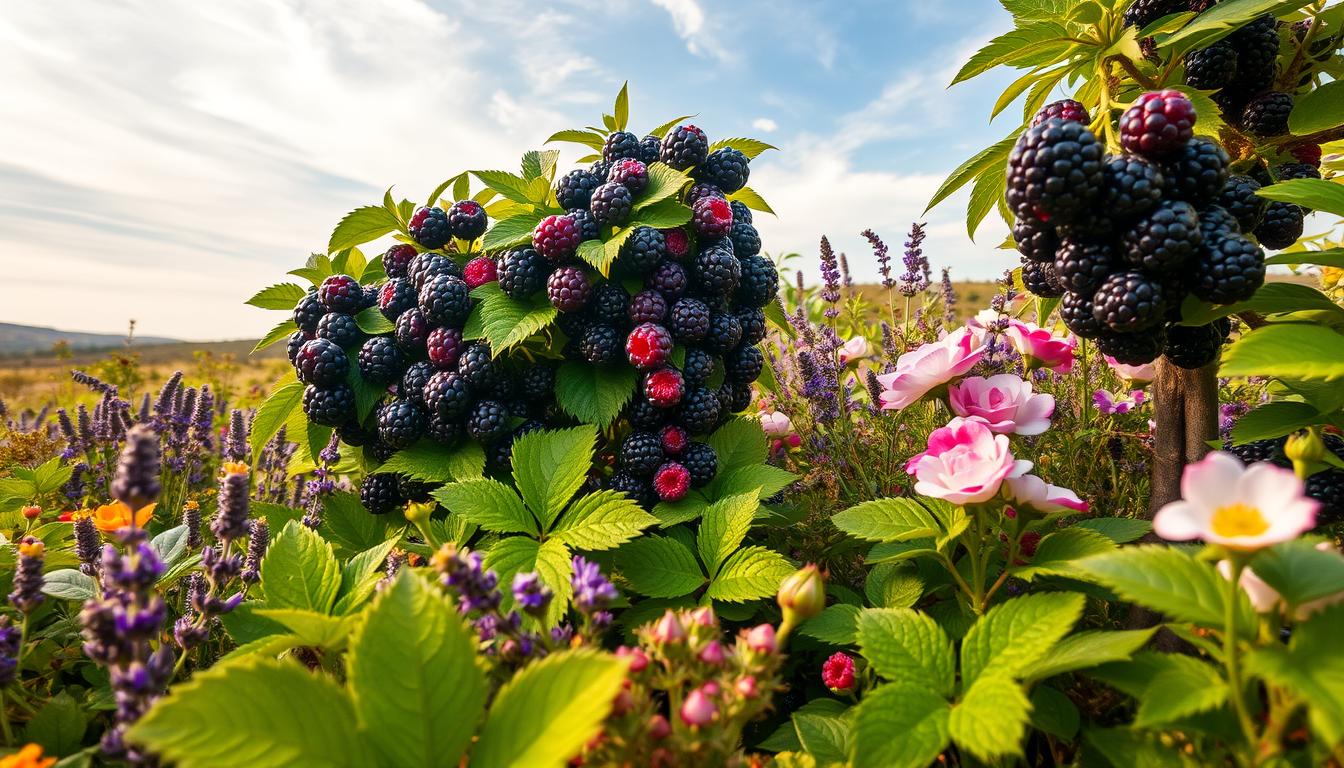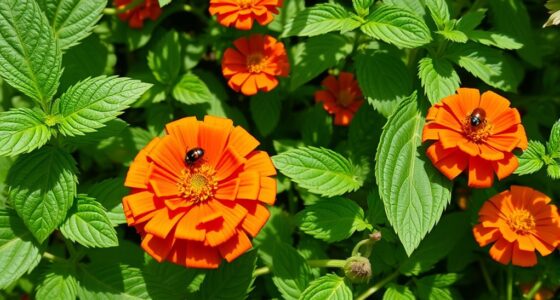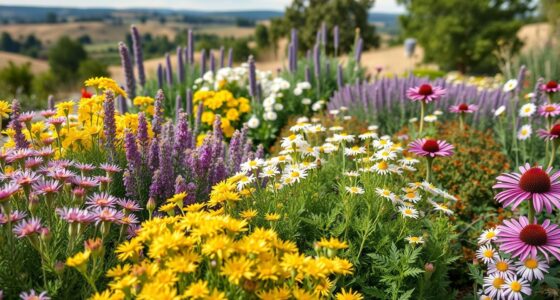Imagine stepping into your garden on a warm summer day, the air filled with the sweet aroma of sun-ripened blackberries just waiting to be picked. The thrill of harvesting your own berries is an experience that connects you deeply with nature and the fruits of your labor. But did you know that by selecting the best companion plants for blackberries, you can enhance not just the growth and health of your blackberries but also create a thriving ecosystem right in your backyard? Companion planting with blackberries is more than just pairing plants; it’s about cultivating a vibrant community that supports each other. Whether you’re just starting out or looking to expand your berry patch, understanding these beneficial relationships is crucial for maximizing your blackberry garden companions. Together, let’s explore the richness that comes from planting smart and nurturing those flavorful berries you adore.
Key Takeaways
- Companion plants can enhance blackberry growth and health.
- Creating a thriving garden community supports biodiversity.
- Smart planting helps maximize your berry harvest.
- Understanding companion relationships is essential for gardeners.
- Pairing the right plants with blackberries enhances flavors and yields.
Understanding Blackberry Companion Planting
Companion planting plays a significant role in creating a thriving garden, especially for blackberries. By understanding blackberry companion planting, you can harness the natural benefits of your garden environment. The concept centers around the strategic pairing of plants to enhance growth, deter pests, and promote overall health.
What is Companion Planting?
Companion planting refers to the practice of growing different plants together for mutual benefits. This traditional technique fosters a relationship among various species, where each plant contributes to the well-being of the others. You might find that certain plants will enhance nutrient uptake or provide protection against pests. This relationship is crucial for optimizing plant health and productivity.
Benefits of Companion Planting
There are numerous benefits of companion planting that extend beyond simple aesthetics. Increased crop yields and improved pollination are notable advantages. The right combinations can lead to natural pest control, which reduces the need for chemical interventions. Companion planting creates an inviting space for beneficial insects, thus supporting a healthier garden ecosystem. By understanding these benefits, you can tailor your garden strategies effectively.
How it Works for Blackberries
When it comes to blackberries, companion planting works by selecting plants that provide shade, attract pollinators, or deter unwanted pests. Certain companions can balance soil nutrients, enhancing the growth of blackberry bushes. The overall resilience of your garden improves, leading to more flavorful and abundant fruit production. Incorporating these principles can dramatically transform your gardening approach.
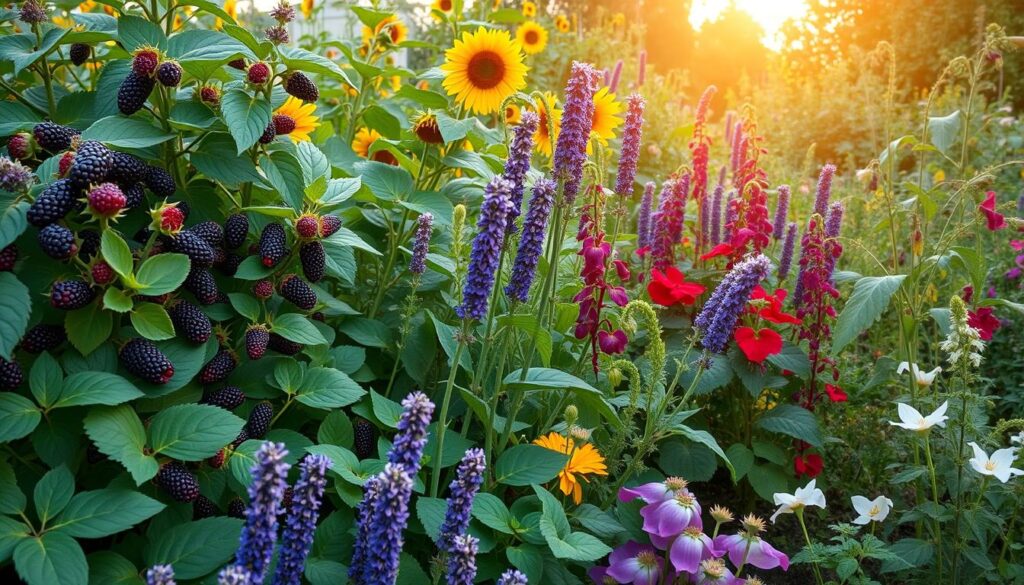
Best Companion Plants for Blackberries
When growing blackberries, selecting the best companion plants can enhance growth, flavor, and pest resistance. Certain plant combinations create a supportive ecosystem that benefits your berry bush. Below are some excellent choices to consider.
Cloverse as Ground Cover
Clover serves as an effective ground cover due to its nitrogen-fixing properties. This aspect improves soil fertility and supports the growth of blackberries. Moreover, clover’s low-growing nature minimizes the presence of weeds, while helping to retain moisture, creating an ideal environment for your blackberry plants.
Marigolds for Pest Control
Marigolds are popular companions in many gardens due to marigold pest control benefits. These vibrant flowers help repel unwelcome pests like nematodes and aphids, acting as a natural barrier to keep your blackberry bushes healthy. The splash of color provided by marigolds not only beautifies your garden but also creates a protective environment for your plants.
Chives to Boost Flavor
Chives are another great addition as they contribute to chives flavor enhancement while deterring harmful insects. Not only do they add a delightful onion-like flavor, but they also help attract beneficial pollinators, fostering a thriving garden ecosystem that positively impacts your blackberry harvest.
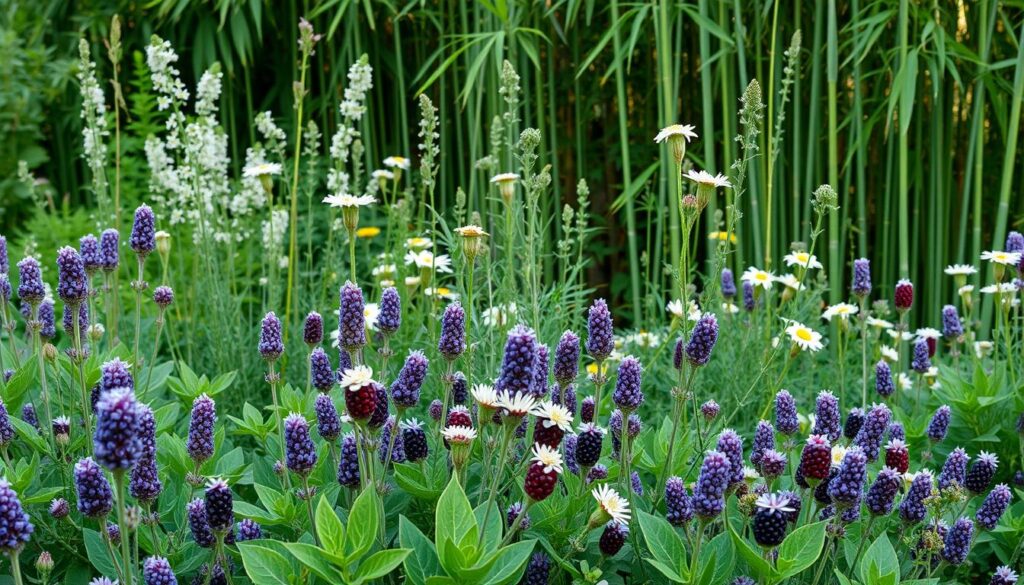
Herbs That Pair Well with Blackberries
Integrating herbs with blackberries not only enhances flavor but also boosts health and pest control for your garden. Three standout herbs provide remarkable benefits that can elevate your blackberry-growing experience.
Basil for Flavor and Health
Basil not only complements the juicy sweetness of blackberries but offers numerous health benefits as well. Its anti-inflammatory properties contribute to overall wellness, making it a great addition to your garden. Plus, basil’s enticing aroma attracts pollinators, fostering a thriving fruit crop.
Oregano’s Protective Qualities
Oregano is an excellent choice for those seeking oregano protection in their garden. This herb is known for repelling harmful pests and can act as a natural insecticide. With oregano nearby, your blackberry plants can flourish without the threat of infestations, enhancing their health and productivity.
Mint: Caution and Control
Mint brings valuable pest-repelling qualities to your garden, aiding in mint control. Its strong scent deters various insects that may harm blackberries. Caution is essential, as mint can spread aggressively. Implementing containment strategies ensures that it coexists harmoniously with your blackberries without overpowering them.
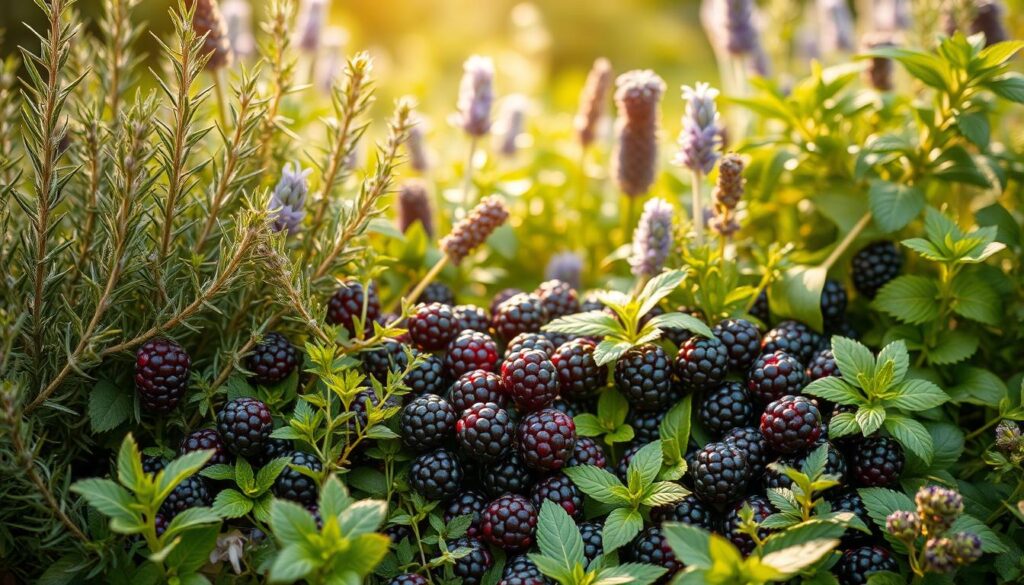
Vegetables to Consider with Blackberries
When planning your garden, considering the right vegetables with blackberries can enhance both growth and harvest. Some vegetables complement blackberries beautifully, creating a thriving ecosystem in your garden. Let’s take a look at a few optimal pairings.
Peppers Complementing Blackberries
Peppers and blackberries thrive under similar growing conditions, making them an ideal pairing. Both plants appreciate full sun and well-drained soil, allowing for efficient use of garden space. By planting peppers and blackberries together, you can maximize your yields while ensuring both plants get the care they need.
Tomatoes: A Classic Duo
The compatibility of tomatoes and blackberries goes beyond taste. Tomatoes benefit from pest-repelling qualities emitted by blackberry plants. This collaboration provides a robust growth environment for each, allowing them to share nutrient requirements and flourish together.
Lettuce for Soil Protection
Lettuce serves as a fantastic ground cover that promotes soil health, offering lettuce soil protection. The presence of lettuce helps conserve moisture and adds organic matter to the soil as it decomposes, creating a supportive environment for the more substantial blackberry plants to thrive.
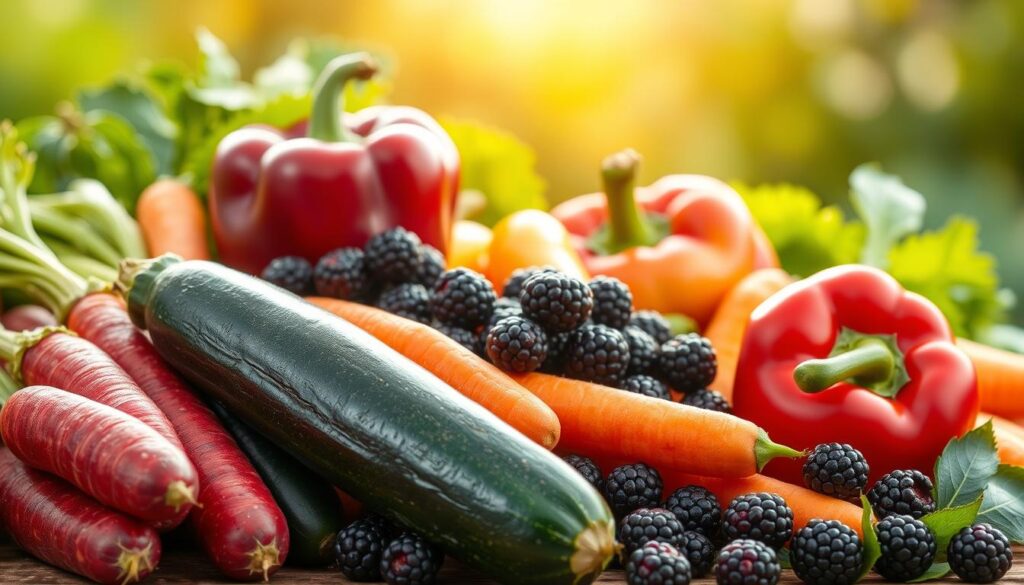
| Vegetable | Compatibility Benefits |
|---|---|
| Peppers | Thrives in similar conditions as blackberries |
| Tomatoes | Pest-repelling qualities enhance growth |
| Lettuce | Provides soil protection and moisture retention |
Flowers That Thrive Alongside Blackberries
Enhancing your garden with vibrant flowers not only adds beauty but also provides essential benefits to your blackberry plants. The right flowers with blackberries can improve insect activity, deter pests, and increase pollination efforts.
Nasturtiums: A Colorful Choice
Nasturtiums are a fantastic addition to any garden. The nasturtiums color choice brings a lively pop of color while attracting beneficial insects like pollinators and predatory pests. Additionally, their edible flowers add culinary appeal, making them a delightful companion to your blackberries.
Sunflowers for Pollinator Attraction
Sunflowers play a crucial role in enhancing sunflowers pollination. By attracting bees and other pollinators, these tall blooms significantly improve the fruit yield of nearby blackberries. Their ability to draw in essential insects makes them a strategic choice for any gardener seeking to boost production.
Calendula to Deter Pests
Calendula is well-known for its remarkable role as a calendula pest deterrent. The vibrant blooms not only beautify the garden but also repel harmful insects that threaten blackberry plants. This flower effectively supports a healthier growing environment while enhancing the overall aesthetic of your outdoor space.
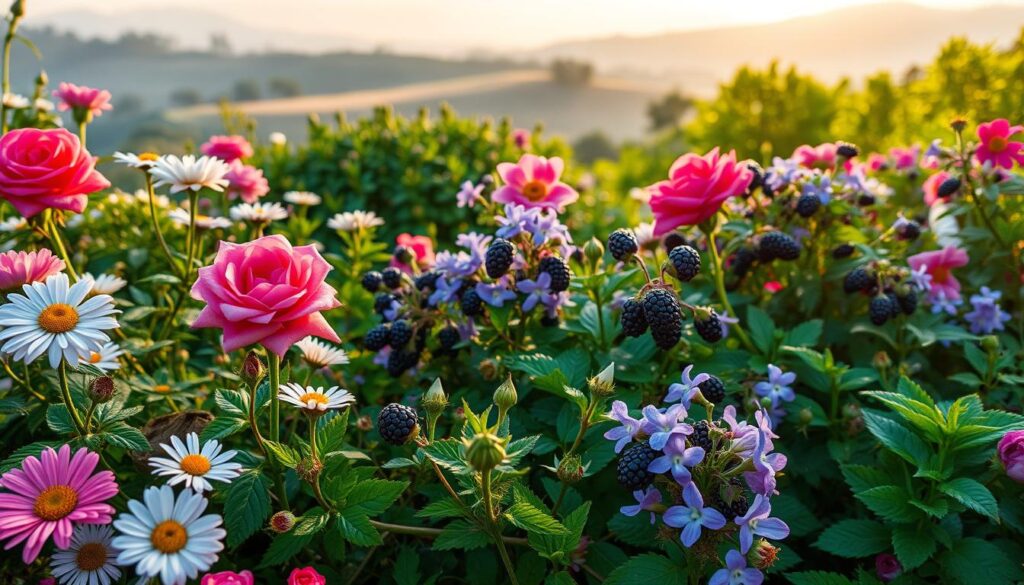
Fruits That Do Well Near Blackberries
When planning your garden, considering fruits that flourish alongside blackberries can lead to a vibrant and productive plot. Combining these fruits not only maximizes space but also promotes mutual benefits such as improved pollination and growth. Here are some excellent fruit choices.
Strawberries as Ground Companions
Strawberries serve as perfect strawberries ground companions for blackberries. Their similar growing conditions ensure that both can thrive together. Additionally, strawberries enhance pollination, benefiting not only themselves but also the nearby blackberries. Their ability to prevent soil erosion and moisture loss makes them an excellent choice for a healthy garden.
Raspberries: Similar Needs, Harmonious Growth
Raspberries and blackberries share comparable needs in terms of sunlight, water, and soil requirements. Integrating raspberries and blackberries in your garden leads to efficient space utilization. These fruits grow harmoniously, allowing you to enjoy an abundance of both while attracting beneficial pollinators to the area.
Blueberries for Diverse Harvests
Blueberries can complement your blackberry cultivation effortlessly, creating blueberries diverse harvests throughout the growing season. They thrive under similar care conditions, contributing to a rich biodiversity. Sharing pollinators with blackberries enhances yields and offers a wider variety of fruits for you to enjoy, adding both flavor and color to your garden.
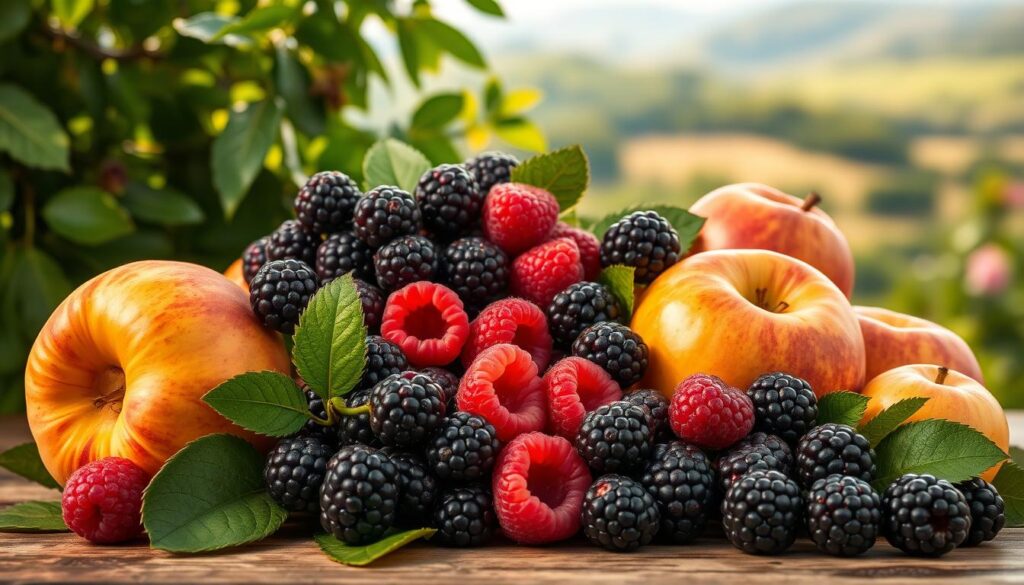
| Fruit | Benefits as Companions | Growing Conditions |
|---|---|---|
| Strawberries | Enhance pollination and prevent soil erosion | Well-drained soil, full sun |
| Raspberries | Efficient space use, similar care needs | Moist, rich soil, full sun |
| Blueberries | Share pollinators, promote diverse harvests | Acidic soil, consistent moisture |
What to Avoid Planting with Blackberries
When planning your garden, it’s essential to know what to avoid planting with blackberries to ensure healthy growth and productive yields. Some plants may compete for resources or introduce risks that can negatively impact your blackberry bushes. Below are some plants you should consider keeping away from your blackberries.
Grape Vines: Competition for Space
Grape vines thrive in similar conditions as blackberries, resulting in grape vines competition for sunlight, water, and nutrients. Planting these two species too close together can lead to decreased yields for both, as they struggle to share limited resources effectively.
Brassicas and Their Nutrient Needs
Brassicas, like cabbage and broccoli, tend to have high brassicas nutrient needs that may conflict with those of blackberries. The significant nutrient demands of these plants can stunt the growth of blackberries and reduce their fruit production.
Nightshades: Potential for Disease
Plants belonging to the nightshades family, such as tomatoes and potatoes, can pose a nightshades disease risk to blackberries. Many diseases associated with these plants can spread to blackberries, decreasing their overall health. Keeping these plants separate promotes a more robust and disease-free garden.
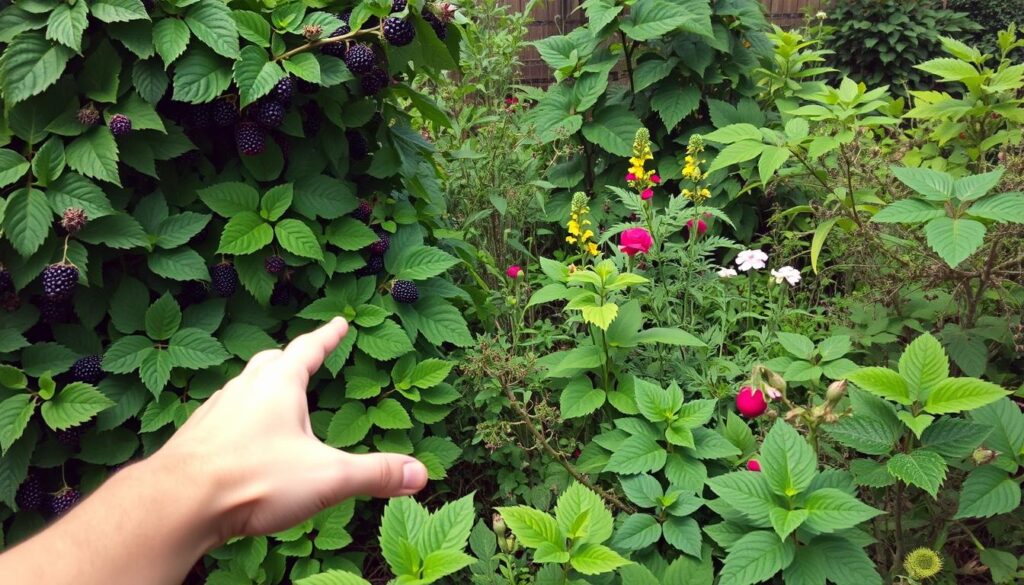
Soil Requirements for Companion Planting
Understanding the soil requirements for blackberries is essential for successful gardening. Blackberries have specific nutrient needs that must be addressed to encourage strong growth and high yields. You’ll find that specific soil characteristics play a vital role in ensuring your plants thrive.
Nutrient Needs of Blackberries
Blackberries prefer nitrogen-rich soil that promotes healthy foliage and fruit development. When choosing companion plants, consider those that enhance nutrient needs by adding essential minerals back into the soil. Legumes, like clover, can naturally fix nitrogen, contributing positively to the blackberry’s growth.
Best Soil pH Levels
The best soil pH range for blackberries falls between 5.5 and 6.5. Testing your soil’s pH and making adjustments if necessary can significantly impact blackberry plant health. Companions like clovers and certain herbs can also help stabilize pH levels naturally.
Improving Soil Quality Together
Planting specific companion plants not only enhances the nutrient content but also aids in improving soil quality. Techniques such as careful mulching, root collaboration, and beneficial microorganisms created by certain plants can offer a well-rounded ecosystem for blackberries. Integrating these strategies will support long-term productivity in your garden.
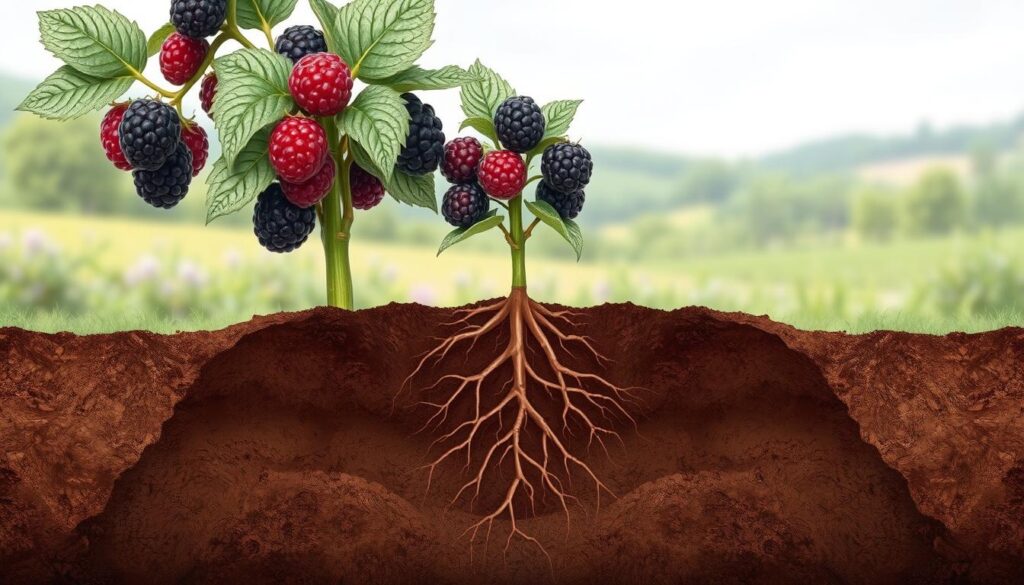
| Soil Characteristics | Optimal Range | Suggestions for Improvement |
|---|---|---|
| Nitrogen Levels | Medium to High | Legumes like clover, compost |
| Soil pH | 5.5 – 6.5 | pH testing kits, lime for increase, organic matter for decrease |
| Drainage | Well-Draining | Sand, organic matter addition |
Watering Needs of Blackberry Companions
Understanding the watering needs for blackberries is essential for promoting their health and yield. Consistent moisture helps blackberries and their companions thrive, minimizing competition for water resources. By implementing effective watering techniques, you can nurture a flourishing garden environment.
Consistency is Key
Maintaining a steady moisture level is crucial for the robust growth of blackberries and their companion plants. Regular watering ensures that plants receive the hydration they need, preventing stress that can hinder growth. Monitoring soil moisture will help you adjust your watering routine accordingly, ensuring that both blackberries and companions enjoy a healthy balance.
Companion Plant Watering Techniques
Using effective watering techniques can enhance the health of your blackberry companions. Drip irrigation systems or soaker hoses are excellent options. These methods deliver water directly to the root zones, minimizing waste and promoting deeper root growth. This targeted approach not only supports the watering needs for blackberries but also benefits companion plants.
Signs of Overwatering
Recognizing signs of overwatering is vital for maintaining plant health. Yellowing leaves, wilting plants, and root rot are clear indicators that water levels may be excessive. Ensuring proper drainage and observing plant responses to moisture conditions will help you prevent the detrimental effects of overwatering on blackberries and their companions.
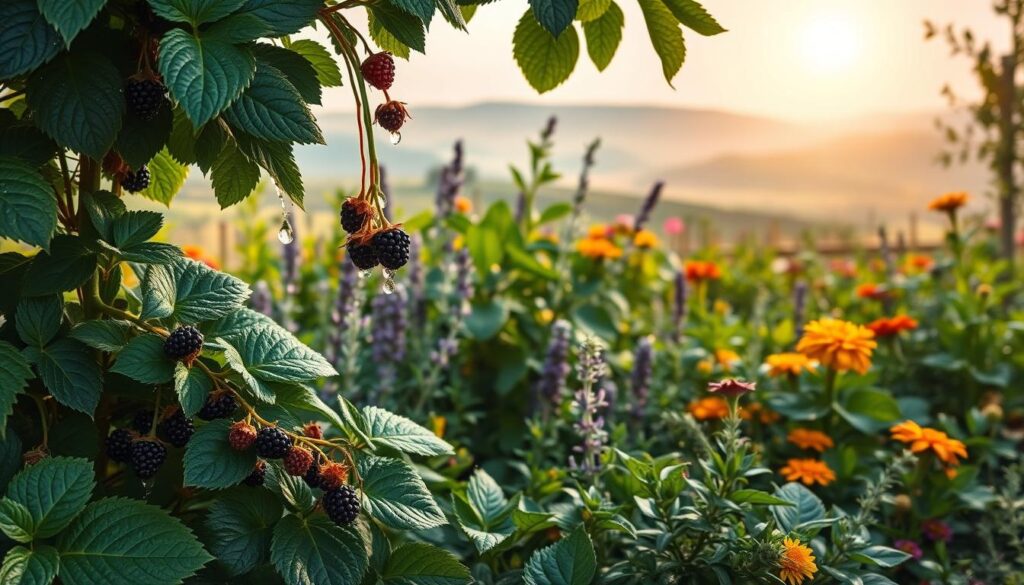
| Watering Technique | Benefits | Signs of Overwatering |
|---|---|---|
| Drip Irrigation | Targets roots, conserves water | Yellowing leaves |
| Soaker Hoses | Even moisture distribution | Wilting plants |
| Hand Watering | Allows for close monitoring | Root rot |
Fertilizing Strategies for Blackberry Companions
Successful blackberry cultivation relies not just on companion planting but also on effective fertilizing strategies for blackberries. Understanding how to best nourish your blackberries can enhance growth and fruit production. This section will explore the differences between organic vs synthetic fertilizers, the appropriate timing of fertilization, and the essential nutrients for blackberry health.
Organic vs. Synthetic Fertilizers
Your choice of fertilizer plays a significant role in the overall health of blackberry plants. Organic vs synthetic fertilizers both have unique advantages. Organic options, such as compost or well-aged manure, build and strengthen soil health over time, offering long-term benefits. Synthetic fertilizers can deliver a rapid boost of nutrients, helping you see immediate results. Finding a balance between these two can create an optimal environment for your blackberry companions.
Timing of Fertilization
Getting the timing of fertilization right is crucial in maximizing yield potential. Fertilizing before blooming and fruiting periods allows your plants to absorb the necessary nutrients effectively. Implementing the correct timing of fertilization will support strong growth, leading to thriving blackberry crops. Careful planning will ensure your companions receive nutrients when they need them most.
Specific Nutrients for Health
To maintain robust blackberry health, focus on supplying specific nutrients essential for growth. Blackberries thrive particularly when provided with potassium and phosphorus. Regular soil testing can help you assess nutrient levels and make informed decisions on when and how much to fertilize. This careful attention to nutrients for blackberry health will foster a fruitful and vibrant garden.
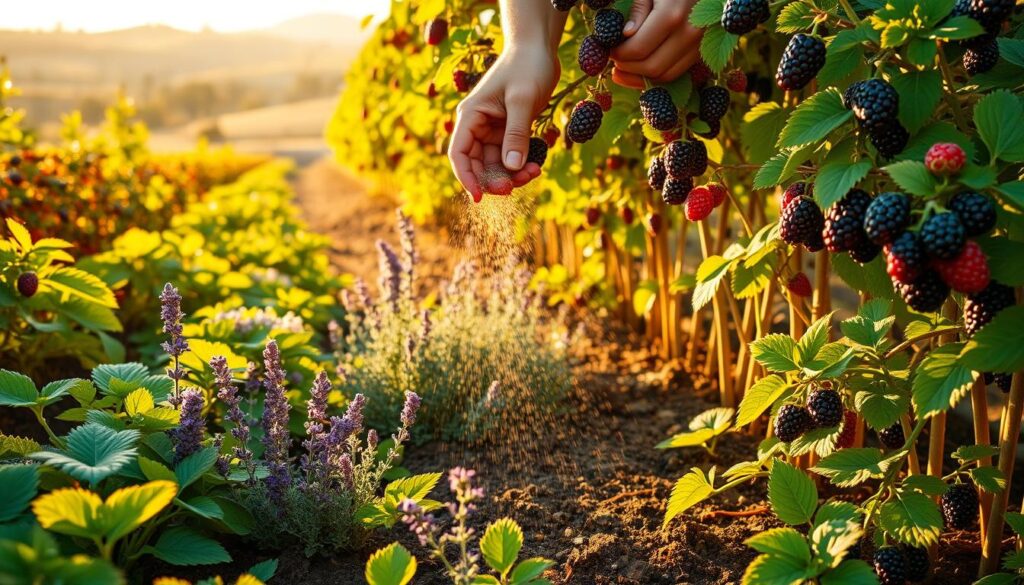
Pests and Diseases in Blackberry Planting
Managing pests and diseases in blackberry planting is essential for a fruitful harvest. Familiarizing yourself with common blackberry pests allows for timely interventions that can save your crop from significant damage. Regularly inspecting your plants helps to spot issues early, making it easier to implement control measures.
Identifying Common Pests
Among the common blackberry pests to watch out for are aphids, spider mites, and Japanese beetles. Each of these pests can lead to reduced plant vigor and yield if left unaddressed. Monitoring your blackberries for signs of infestations will enable you to take swift action and protect your plants effectively.
Natural Remedies for Pest Control
Implementing natural pest control methods is an excellent way to deter pests without exposing your plants to harmful chemicals. Incorporating companion plants such as marigolds can attract beneficial insects while chives release natural compounds that repel many common pests. These strategies foster a healthier growing environment for your blackberries.
Disease Prevention Techniques
Practicing proper disease prevention techniques is vital for maintaining the health of your blackberry plants. Techniques such as crop rotation, which prevents the buildup of soil-borne diseases, and maintaining adequate plant spacing for air circulation can significantly minimize disease risks. By following these practices, you promote robust growth and reduce care complications.
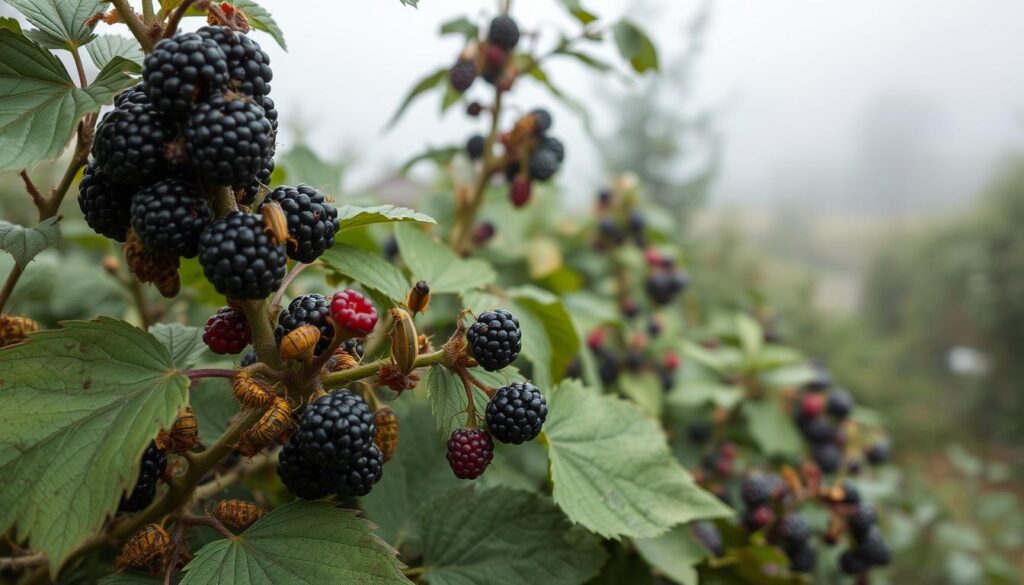
| Pest/Disease | Identification | Control Method | Prevention Technique |
|---|---|---|---|
| Aphids | Sticky residue on leaves, curled leaves | Insecticidal soap, neem oil | Introduce ladybugs and lacewings |
| Spider Mites | Fine webbing on leaves, yellow spots | Water spray, predatory mites | Increase humidity, proper watering |
| Japanese Beetles | Skelatonized leaves, visible beetles | Handpicking, traps | Crop rotation, companion planting |
| Fungal Diseases | Wilting, dark spots on leaves | Fungicides, copper sprays | Rotate crops, proper spacing |
Seasonal Considerations for Planting
Successfully managing your blackberry plants involves understanding the seasonal considerations for blackberries. Each season presents unique opportunities and tasks that can affect the health and productivity of your plants. Here are some essential tips for each season to ensure you get the most out of your blackberry companions.
Spring Planting Tips
Late winter is a prime time for planting blackberries. This timing allows the plants to establish roots before the heat of summer sets in. For optimal growth, preparing the soil in advance is crucial. You should enrich it with organic matter and ensure proper drainage. This early start can lead to stronger plants that produce abundantly.
Summer Care for Blackberry Companions
As temperatures rise, maintaining consistent moisture becomes vital. Summer care involves watering your blackberry companions regularly to prevent stress. Implementing mulching around your plants can help retain soil moisture while also suppressing weeds. A well-maintained environment during the hot months enhances the overall productivity of your garden.
Fall Preparations for Next Year
Once harvest season concludes, it’s time to focus on fall preparations. Proper pruning of your blackberries after harvesting not only protects the roots during winter but also promotes healthier growth for the next season. Applying mulch can further insulate the roots and improve soil nutrient levels, setting the stage for a bountiful spring.
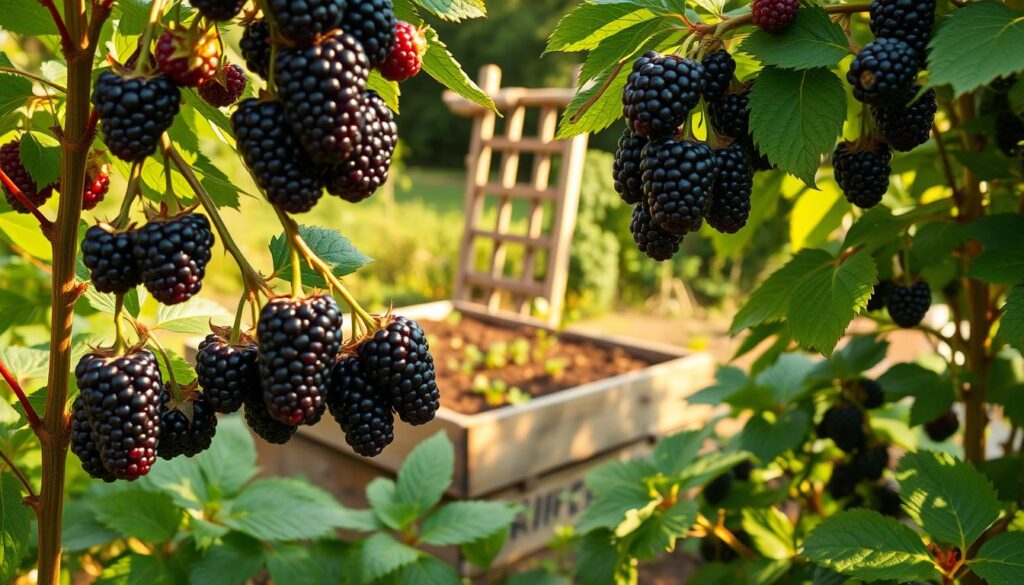
| Season | Key Tasks | Focus Area |
|---|---|---|
| Spring | Planting and soil preparation | Root establishment |
| Summer | Watering and mulching | Moisture retention |
| Fall | Pruning and mulching | Winter protection |
Expanding Your Blackberry Planting
Enhancing your garden with expanding blackberry planting not only boosts your fruit yield but also enriches your gardening experience. This process involves thoughtful approaches to berry patch creation and incorporates new companion plants that support a thriving ecosystem. By focusing on optimized layouts now, you can significantly enhance your garden’s future productivity.
Creating a Berry Patch
Establishing a dedicated area for your berry plants allows for efficient management of your harvests. Implementing a berry patch creation strategy can include a variety of berries that flourish together. Organizing your patches can make it easier to track growth and production while encouraging pollination and biodiversity.
Integrating New Companion Plants
Introducing new companion plants into your berry patch can enhance your blackberry plants’ health. Gradual integration offers the opportunity to observe how these plants interact with blackberries. Ensuring a balanced ecosystem helps facilitate nutrient sharing and provides natural pest control, ultimately promoting more vigorous growth.
Planning for Future Growth
Effective planning for future growth involves careful consideration of your garden’s layout and companion selections. Rotate your crops periodically to maintain soil fertility and prevent disease. Regular assessment of growing conditions will help you make informed decisions about plant placement, paving the way for productive seasons ahead.
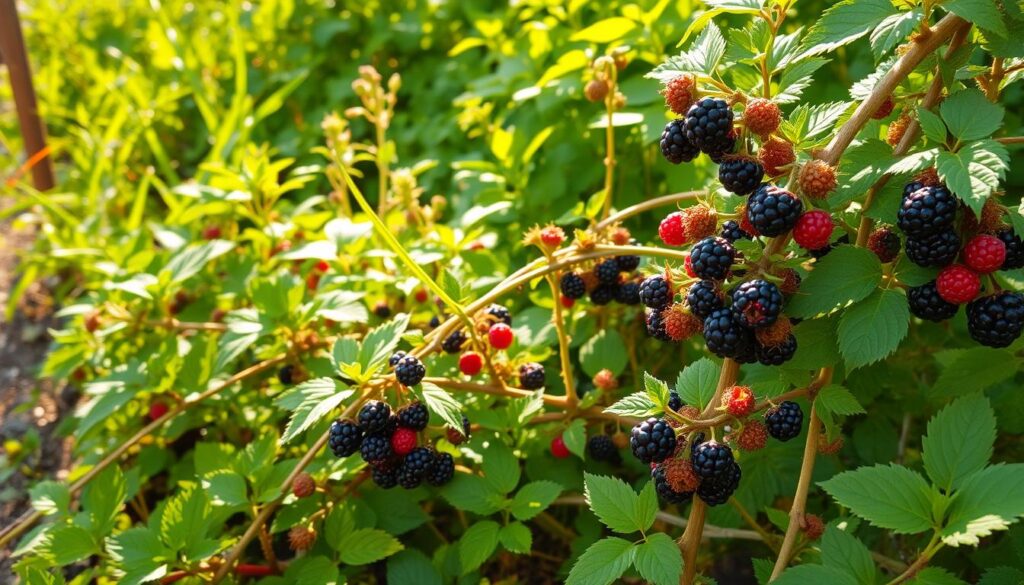
Encouraging Wildlife in Your Garden
Creating a vibrant garden not only beautifies your space but also significantly contributes to encouraging wildlife. By attracting pollinators in your garden, you enhance the ecosystem surrounding your blackberries. Understanding how to create an environment that fosters beneficial insects leads to a more productive and balanced garden.
Attracting Pollinators with Flowers
Incorporating a variety of flowering plants, such as sunflowers and nasturtiums, serves to draw essential pollinators. These flowers not only appeal to bees and butterflies but also improve the fruit set for your blackberries and other plants. Planting these vibrant flowers increases your garden’s ability to attract the necessary pollinators in garden, ensuring strong yields and diverse crops.
Creating Habitats for Beneficial Insects
Introducing elements like insect hotels or native plants can create habitats that encourage the presence of beneficial insects. These natural predators help control pest populations, fostering a healthy cycle of pest management. By dedicating a portion of your garden to these plants, you nurture an environment that thrives on balanced biodiversity.
Balancing Biodiversity in Your Space
Emphasizing a diverse range of plants contributes to your garden’s overall well-being. A healthy mix of flora not only minimizes pest issues but also promotes vibrant ecosystems, enhancing the environment for all your plants, including blackberries. As you cultivate your garden, keep in mind that a commitment to biodiversity will ensure long-term health and vitality.

Harvesting and Enjoying Blackberry Companions
When you dive into the rewarding experience of harvesting blackberries, knowing the optimal time for collection is vital. This ensures maximum flavor and a burst of sweetness in every berry. Easy signs to look for include a dull appearance on the berries and a deep, dark color. Enjoy the fruits of your labor while also embracing the joy of cooking with companions.
When to Harvest Blackberries
Timing is crucial when it comes to harvesting blackberries. You’ll know they are ripe when they no longer have their shiny look and have turned completely dark. Picking at this stage guarantees a deliciously sweet berry that enhances your meals.
Using Companion Plants in Cooking
Many of the plants that thrive alongside blackberries can take your culinary adventures to another level. For instance, fresh herbs like basil and chives not only add flavor but also contribute essential nutrients to your dishes. Including these companion flavors allows you to elevate simple meals into gourmet experiences, transforming the way you cook.
Preserving and Storing Your Produce
Once you have harvested your fruits, you’ll want to make the most of them through preserving produce techniques. Options like freezing and canning allow you to enjoy your blackberries long after the season ends. These methods not only maintain freshness but also provide you with the flexibility to enjoy your garden’s bounty all year round.
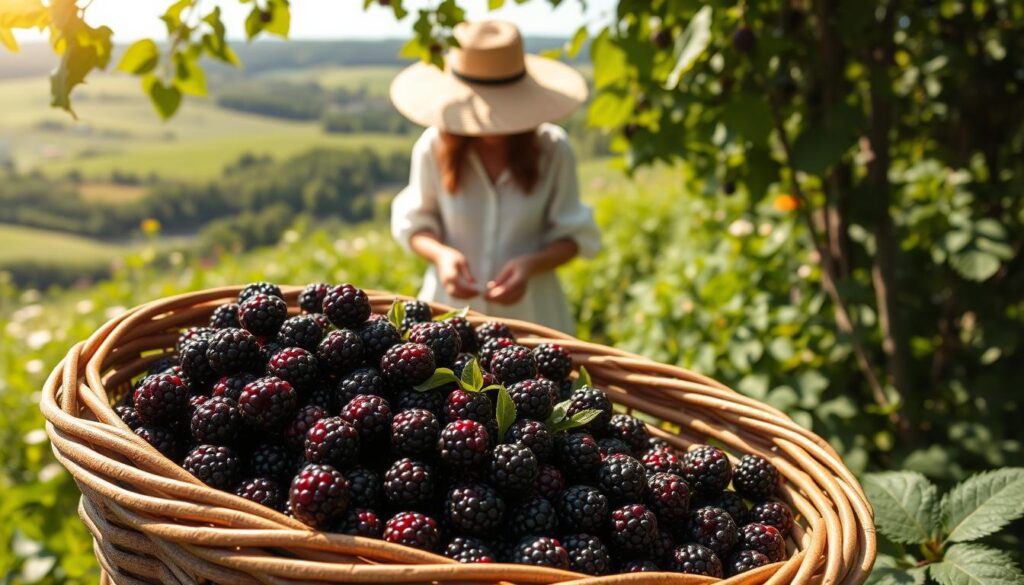
Conclusion: Maximizing Your Blackberry Garden
As you reflect on your journey into the world of blackberry gardening, it’s essential to recognize the significant advantages of companion planting. By integrating beneficial plants, you not only enhance the health and resilience of your blackberries but also create a thriving garden ecosystem. The benefits of companion plants extend beyond just pest control; they improve soil quality, boost overall yield, and foster a harmonious growth environment. With strategic combinations, your blackberry garden can flourish like never before.
Remember, gardening is a continuous learning process filled with opportunities for experimentation and discovery. Don’t hesitate to try different combinations in your garden. Each season offers new challenges and rewards, so embrace the journey with an open mind. The gardening encouragement you need is within reach—every effort contributes to a more robust and productive garden.
In conclusion, choosing the right companions can significantly impact the success of your blackberry plants and the overall health of your garden. As you explore these companion planting strategies, take the time to observe and assess what works best for you. The joy of nurturing plants and watching them thrive will make your efforts towards maximizing your blackberry garden truly satisfying.
